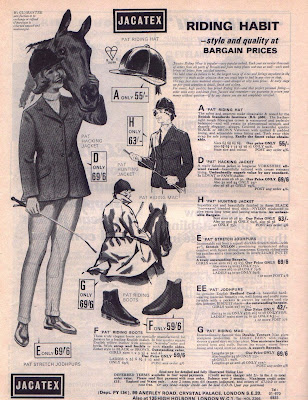A lot of the things I was very fond of as a child, like Cadbury's chocolate, Enid Blyton, and Walter Farley's Black Stallion, I have rather gone off. But I still love Diana Pullein-Thompson's
Three Ponies and Shannan (1947). I had the creamy 1960s Armada with the cover by Peter Archer (scroll down to see it). What I liked about
Three Ponies was the heroine, Christina. Christina was not like other pony book heroines. If this had been a pony book which trotted obediently down party lines, this is how the plot would have gone: noble Heather and Pat have moved out of their ancestral home after their family loses its money, and their friend Charlie Dewhurst is thoroughly on their side. Rich girl Christina moves in to the ancestral home. Her family destroy everything wonderful about the house, and Christina swanks around with her three ponies and her groom, until poor but noble Charlie shows Christina the error of her spoiled, moneyed ways and the value of honest toil. And wins at the gymkhana at the end of the book.
 |
| Collins first edition, 1947, illus Anne Bullen |
But it's not Christina who's the spoiled and vindictive one: it's Charlie, who is the child of the vicarage. (Not an easy row to hoe either, as it happens – is there any vicar's child who hasn't had someone express their surprise that they have behaved badly, bearing in mind who their parent is?)
Christina can't help the fact her parents have bought the house. She appreciates just how lucky she is to have three wonderful ponies, and her wolf hound Shannan, but we see just how hard it is for her to overcome the sterotype all the pony owning children in the district are sure she represents. It's a sterotypical picture Charlie does all she can to promote, and when she acts with her friends Heather and Pat, we have a thoroughly believable picture of bullying and victimisation. They judge Christina without bothering to get to know her. To them, she must be objectionable because she's rich, and so that's how they treat her.
 |
| Armada pb, 1968, cover Peter Archer |
I sympathised with Christina. I think all of us know how it feels to come into a room full of people who have made up their mind about you before they've even met you, and it's interesting to see it done in this book. We're all judged, aren't we, whether you're looked down on because you don't have a pony, or envied because you do, or despised because you wear the wrong clothes ... or too many of the right ones.
 |
| Collins Pony Library, 1974, cover Geoffrey Whittam |
Diana Pullein-Thompson made a deliberate decision to write a character who was wealthy, but who was still a decent and thoughtful character. When I interviewed her, she said:
I saw all around me how richer children were scorned, especially if they had grooms, so I deliberately decided to see life a little bit from their point of view. We had scores of pupils. And from my own experience there could be pleasant rich children and horrid poor ones, so yes, it was a deliberate decision.
 |
| Armada pb, 1970s |
The point is, of course, that ponies like any other animal, could not care less what class you are. What matters to them is how you treat them.
~ 0 ~
A note on the publishing history:
Three Ponies and Shannan was one of Diana Pullein-Thompson's most popular books. It was originally printed in 1947 by Collins, with illustrations by Anne Bullen (and an oddly colourless cover illustration), and was reprinted in that format several times. Armada, the paperback arm of Collins, reprinted the book in 1968 with a cover illustration by Peter Archer, and again with a photographic cover in the 1970s. (I do wonder if those are horses or ponies on the front cover). The book was given yet another new cover illustration in 1974, when it was issued as part of the Collins Pony Library with a cover by Geoffrey Whittam.
For all of Diana Pullein-Thompson's books in glorious colour (is anything in black and white these days?) she has a
page on my website.






Comments